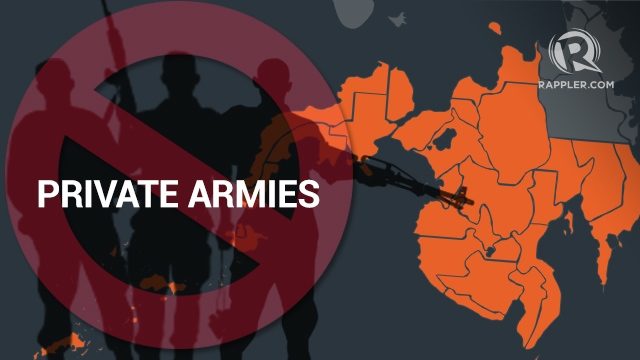SUMMARY
This is AI generated summarization, which may have errors. For context, always refer to the full article.

MANILA, Philippines – Malacañang has activated a task force that will disband private armed groups in the proposed Bangsamoro core territory and adjacent regions to “stabilize” the security situation in the area.
The Office of the President issued Memorandum Circular 83, dated September 2 but released only on Tuesday, September 8, creating the National Task Force for the Disbandment of the Private Armed Groups (NTF-DPAGs) in the areas of the proposed Bangsamoro and in Regions 9, 10, 11, and 12.
“There is a need for the creation of the National Task Force that would focus on disbanding the PAGs in the proposed Bangsamoro core territory and adjacent regions in order to stabilize the security situation,” MC 83 read.
It said this is needed to “effectively implement the other measures stipulated in the CAB (Comprehensive Agreement on the Bangsamoro), particularly the gradual and phased decommissioning of the Moro Islamic Liberation Front (MILF).”
MC 83 said that while law enforcers have been waging a “relentless campaign” against private armies, the “menace remains.”
It said this is “because the major causes which primarily contribute to its proliferation such as very low level of human security, gun culture, ‘rido’ or clan war, political dynasties and the use of military and police auxiliaries, still exist in some affected communities.”
“The disbandment of the private armies, together with the gradual and phased decommissioning of MILF weapons and combatants, are part of the bigger normalization process under the accord,” the Office of the Presidential Adviser on the Peace Process (OPAPP) said in a statement.
OPAPP said the normalization process is not in the original draft of the proposed Bangsamoro Basic Law (BBL), as it is part of the mandate of the executive branch and does not require additional legislation.
MC 83 said that a private armed group refers to “an organized group of two or more persons, with legally or illegally possessed firearms, utilized for the purposes of sowing fear and intimidation, and violence for the advancement and protection of vested political and economic interest.”
Functions, members
Under MC 83, the NTF-DPAGs “shall be in charge of policy, planning and implementation of the program for the disbandment of the PAGs including coordination with the relevant bodies pursuant to the CAB and other entities as may be necessary in accordance with the schedule provided in the Annex on Normalization.”
Chaired by the interior secretary, it will have as members representatives from the Department of National Defense, Department of Justice, National Intelligence Coordinating Agency, and Presidential Anti-Organized Crime Commission; the government chief peace negotiator; and the National Bureau of Investigation chief.
From the Philippine National Police, the members include the Director for Intelligence, Director for Operations, regional regional directors in the Autonomous Region in Muslim Mindanao and from Regions 9 to 12, and the PNP Focal Team Head for the Peace Process.
The Armed Forces of the Philippines will be representated by the Deputy Chief of Staff for Intelligence, the Deputy Chief of Staff for Operations, the AFP Peace Process Office Chief, and the commander of the Western Mindanao Command.
The OPAPP is tasked with helping develop a monitoring and reporting system to “determine the development and level of achievements of the activities designed for the dismantling” of the private armed groups.
Under MC 83, the task force would begin work immediately and would cease operations once determined that the private armed groups had been dismantled, and the government and the MILF had signed an “exit agreement,” as stipulated by the CAB, or whichever comes earlier.
The CAB stipulates that the signing of an exit agreement by the government and the MILF will signal the termination of the peace process, and that it “will only be signed if and only when all agreements have been implemented,” OPAPP said. – Rappler.com
Add a comment
How does this make you feel?
There are no comments yet. Add your comment to start the conversation.